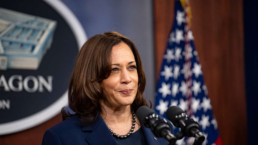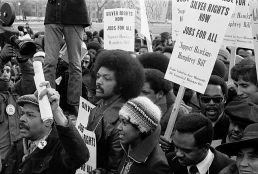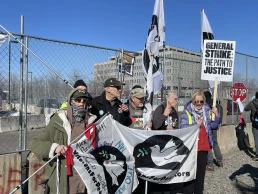If Kamala Harris wants to win with the fragile coalition that propelled Joe Biden to the presidency in 2020, she’ll need to offer more than empty platitudes to black voters.
By India Walton
Back away from the pitchfork! I am well aware of the dangers the right presents. I am worried about the threat of Project 2025. I am terrified of a second Trump presidency that could thrust us into a fascist dictatorship. However my fears should not preclude me from the need and responsibility to be critical of my own party.
Since I was 18 years old, I have proudly showed up to the polls to exercise my right to vote. My ancestors fought and died for that, after all. In 2000 I didn’t fully understand the politics of voting – meaning the implications it had for my everyday life. Voting was my civic duty but seemed like a distant whisper of my values that often fell on deaf ears. It wasn’t until 2005 that I voted for the first time in a local election with great excitement for Buffalo’s first Black mayor. Four years later I cast my vote for our nation’s first Black president. I was inspired to see the rise of Black political leadership, although the material conditions of my life didn’t change a whole lot.
By 2016, having comfortably voted Democrat for 16 years, I “knew” the American people would reject the politics of a narcissist, racist, misogynist in favor of our same run-of-the-mill Democrat. Despite the policies of the Bernie Sanders campaign being wildly popular, the party closed ranks and our candidate was chosen. Who was I to question the DNC? I understand now that I have every right – and I also have a responsibility – to critique the lack of small “d” democracy within the Democratic Party.

The election of Trump caused a sense of panic inside me. I, like many others, wanted to become more involved so that as a community we could survive his tenure and prevent a second. I signed up for my local committee mailing list, but I only ever got invitations for fundraisers. There was no on-ramp to engage meaningfully, to offer insights, or to learn the intricacies of the political process.
I took advantage of every opportunity that was presented to meet people who were as frustrated and excited as me. I found myself in Washington, DC shortly after the inauguration of the 45th president. It was foggy and a misty rain was falling. Speakers each took turns at the microphone proclaiming that we must uphold the legacy of Dr. Martin Luther King. Eventually, the monotony was disrupted by a speech that still inspires me today. That speech was delivered by former Ohio State Senator Nina Turner and it was electrifying. So much so that I wanted to know more about her, who she was, and where she was going. Certainly, being a Sanders delegate, and that dynamic of a speaker, meant she had a bright future ahead. I watched from Buffalo as the Democrats once again “closed rank” supporting the centrist candidate for Congress over Senator Turner.
Two months ago, I was in Chicago at Progressive Central with my colleagues from RootsAction Education Fund. This convening of the progressive wing of the Democratic Party was very different from what I experienced inside the Democratic National Convention and I am grateful that I had the opportunity to experience both. Held at the headquarters of the Chicago Teachers Union and hosted by Progressive Democrats of America, the focus of Progressive Central was on policy that benefits working class people and focusing on diplomacy that centers peace.
Our team also covered the demonstrations outside of the convention and witnessed disruptions at private events that were met with outsized, violent, and unnecessarily militaristic responses. It was a shocking juxtaposition of reality. One wing of the party was literally having a party, while another was grieving, without so much as an acknowledgement of the suffering they had experienced.
Inside of the convention I felt no sense of belonging. I saw delegates drown out the voices of peace demonstrators and even hit them with signs. Once I believed that continued participation by me and those like me is necessary to push our party left, but I fear that progressives are simply absorbed or ousted. If progressives, especially Black progressives with a liberation pedagogy, the Cori Bush’s, Jamaal Bowman’s, Nina Turner’s, India Walton’s have no place in the Democratic Party, then where do we belong? We do not lose for lack of great ideas, brilliance, or even work ethic. We suffer defeat at the hands of our own party simply because our ethos has the potential to create equity in a system that thrives on inequality.
The importance of this historical moment and the significance of Kamala Harris as our first Black female president is not lost on me. The weight of keeping fascism at bay is also very clear. However, despite the gains we have made as a people, when I walked the streets of Buffalo, St. Louis, Philadelphia, and Cleveland, it became ever so clear that Black exceptionalism won’t save us. Our liberation will be fought and won on the front lines, not from ivory towers.
Recent Posts
The Left Owes a Lot to Jesse Jackson
February 19, 2026
Take Action Now As a movement builder, spokesperson, and candidate for the presidency, Jesse Jackson’s accomplishments were massive. He was one of…
Trita Parsi Warns U.S. & Iran Have Incentives to Escalate Conflict
February 19, 2026
Take Action Now “We have a very dangerous situation, because both sides actually believe that a short, intense war may improve their…
Minneapolis: Organizing for the Protection of the Community
February 18, 2026
Take Action Now In speaking with residents in several parts of Minneapolis, beautiful stories of organizing on a block-by-block level emergedBy…
U.S. Sent a Rescue Plane For Boat Strike Survivors. It Took 45 Hours To Arrive.
February 17, 2026
Take Action Now In seas that could kill a person within an hour, it took nearly two days for a rescue plane to arrive.By Tomi McCluskey and Nick…




